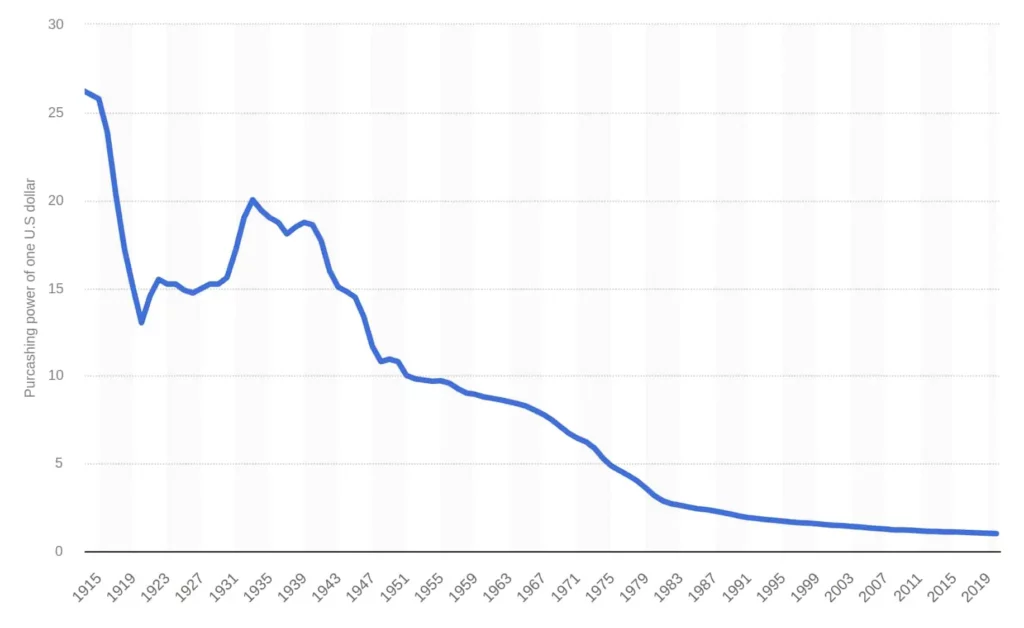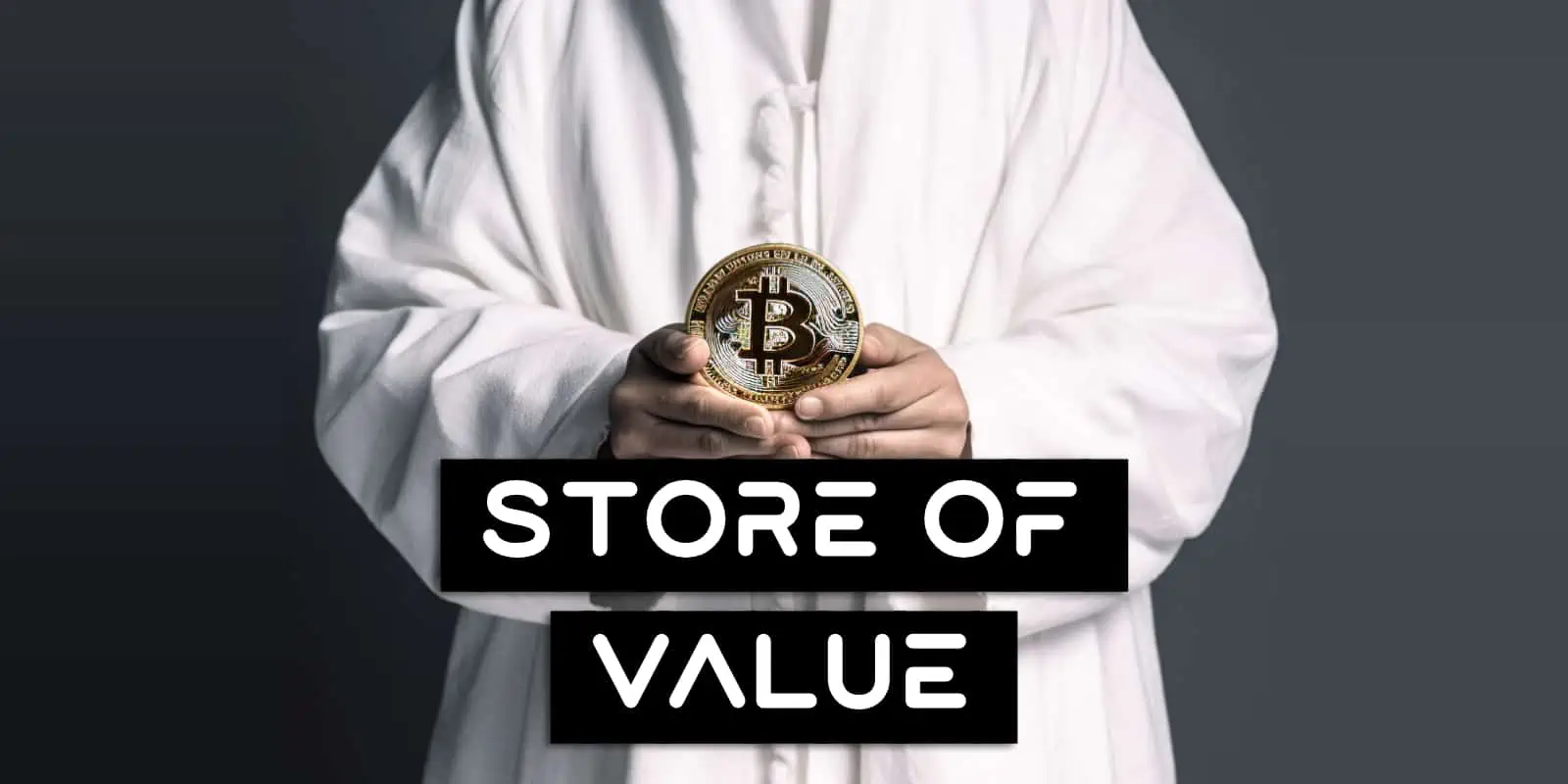In a world where the concept of value seems to constantly shift and evolve, Bitcoin stands out as an apex predator, slowly devouring capital from everything else as it grows larger and larger. Precision engineered from the ground up to be the perfect money, it means that it’s also the perfect Store Of Value too.
But why should you care about weird, economic definitions like store of value or Medium Of Exchange? Well for one thing, it’s essential to understand if you ever want to improve or gain significant wealth in your life. If you ignore it instead, your money will get stolen away by things like inflation or other ongoing carrying costs.
This is the first part of our three part series on the functions of money. Our hope is that this series helps everyone to better understand money at a base level. The other two parts are Medium Of Exchange and Unit Of Account.
Contents
What Is a Store Of Value?
A store of value is any asset, currency or even commodity that has a stable or increasing value over time and does not depreciate. For example, gold has been a good store of value for thousands of years.
Understanding Store Of Value
Having access to a good store of value is one of the core things a species needs to prosper and improve over time. For example, imagine you can catch ten fish each day, but only need five to live. If you can store the value of those five extra fish, you can save up over a period of time and buy a big fishing boat that improves your efficiency and effectiveness. With that boat you can now catch 100 fish a day!
Storing fish over long periods of time is, obviously, a terrible idea though. Which is why “fish” is not something that’s a good store of value. Although anything can technically be a store of value, over thousands of years humans have already figured out what makes the best ones. To be a good store of value the item must have:
- Scarcity: Limited in supply relative to other things
- Durability: Can be used many times and still function, stands the test of time
Fish aren’t good stores of value because they’re not durable or really that scarce either. Gold on the other hand is quite scarce and can sit on a shelf for 1,000 years and be essentially unchanged. It won’t melt if the shelf or house burns down and doesn’t rot or disintegrate.
| Fiat | Bitcoin | Gold | |
|---|---|---|---|
| Scarcity | Low | High | Medium |
| Durability | Medium | High | High |
Scarcity and Durability are just two of the six characteristics of money which we’ve talked about in previous pieces and how they all relate to Bitcoin.
Dive Deeper: What Is A Bitcoin Worth? The Perfect Money
Store Of Value Examples
Historically, people have used many different physical items as stores of value such as seashells, tulips or Rai stones, but throughout all of it the most enduring form of money has been gold. Today people use multiple different things to store their accumulated life value, so let’s have a look at a few store of value examples.
Money
While money can mean many different things, most people mean a fiat currency such as USD, EUR or GBP when they say money. Unfortunately fiat currencies are objectively terrible stores of value. They’re in fact, designed and run to be purposefully bad stores of value.

Most central banks around the world “target” inflation rates of 2-3% per year. While 3% might not sound like that much, it means that if you simply hold onto $1,000 for 30 years, it will only be worth $400!
Precious Metals
Metals like Gold and Silver have been fantastic stores of value for millennia. While both score excellently in durability, gold is superior when it comes to scarcity. Unfortunately metals are heavy and costly to store and transport securely. A store of value is no good if it’s stolen, and this added cost means that every year some of that value “leaks out” in the form of security guards, bank vaults or transportation costs.
Real Estate
Houses, commercial property, land or other real estate has, just like gold, been a very popular store of value for most of human history. Even today it’s used by most people as the main way they store their wealth as it’s not only tangible, but provides a roof over your head and has many tax advantages in most countries.
Real estate is generally scarce and durable over a few decades, however it falls down in a number of areas such as requiring continuous upkeep and maintenance. This, similar to gold, means that some of your stored value “leaks” each year.
Another major downside is that there’s a number of things outside of your control that can effect the value of your property. Governments could levy new taxes, the area could go downhill or be rezoned. Property also isn’t a very liquid asset as you can’t sell it quickly or sell a small part of it (ie. it’s not divisible).
New to Athena Alpha? Start today!
Bitcoin
Bitcoin is still quite new relative to all the other stores of value we’ve covered so far, but it’s the apex predator of the lot which shouldn’t come as a surprise to anyone. Gold is a natural element. Fiat currencies have been cobbled together over decades of countries fighting with each other, wars and politicians making deals on top of deals. Bitcoin by contrast was engineered to be the most perfect money possible.
Bitcoin is the first currency to ever have absolute scarcity. It’s not just “hard to make more of” like gold, it’s impossible to make more of. There will never be more than 21 million bitcoins. Bitcoin is also infinitely durable as it doesn’t deteriorate at all when used because it’s digital.
Bitcoin Carrying Costs are essentially zero as well due to there being no storage costs and no ongoing security costs. Transportation of it is instantaneous and costs again, virtually nothing. On top of all that it’s also highly censorship resistant when used properly, has no third party risks and can be verified cheaply, easily and automatically with a Bitcoin Full Node.
As the world slowly learns about and digests how revolutionary Bitcoin is as a store of value and what that means for everything, right from your everyday Joe all the way up to countries, its value has soared. It is the ultimate savings technology and once people see it, it’s impossible to un-see.
Money As A Store Of Value
While even the best fiat currencies have proven to be terrible stores of value over any decent period of time, a lot of people still don’t properly understand just how damaging it can be to keep their money in the form of fiat currency long term.
In today’s environment, where inflation is particularly bad, you can lose a lot of purchasing power in a relatively short amount of time. For example, in America from 2018 to 2022, just 4 years, there was 16.5% inflation. That means if you kept $1,000 in your bank account in USD over that time period it would only be worth $835.
$1,000 × (1−0.165) = $835
We should make it clear that we are not certified financial advisors and even if we were, we would need to know your specific financial circumstances before saying whether or not using money as a store of value is a good or bad thing for you specifically.
Fiat currencies have many uses and it can absolutely still make sense to hold cash for many people out there. But. We want you to fully understand that holding money does have risks associated with it too. Bitcoin also has its own risks which we’ve covered before as well.
Like so many things in life what the best store of value for you will depend on various factors like what you plan to do with the money in the future, when you’ll need it, what your risk profile is, what stage in life you’re at and many more things.
Thankfully though, if you do need the best store of value one day, you have Bitcoin available to ensure your wealth is safe, censorship resistant and most importantly durable and scarce.
FAQ
What Is Meant By The Store Of Value?
A store of value is any asset, currency or commodity that retains its value over time and does not depreciate. For example, gold and silver have been excellent stores of value for thousands of years.
What Is An Example Store Of Value?
For many thousands of years Gold has been one of the top stores of value. Other examples include real estate, other precious metals like palladium and platinum, and further back in history things like seashells, tulips or Rai stones.
Is Bitcoin A Store Of Value?
Yes. Although Bitcoin is still quite new compared to other stores of value like gold, it has proven to retain is value over many years compared to virtually any other asset.
Is A Credit Card A Store Of Value?
No. Credit cards simply store value in the form of whatever fiat currency they’re issued in, such as USD. Fiat currencies from advanced economies like the USA or Europe traditionally hold their value over a short period of time such as 1-5 years, but do not store value well over longer periods such as 10-30 years.



